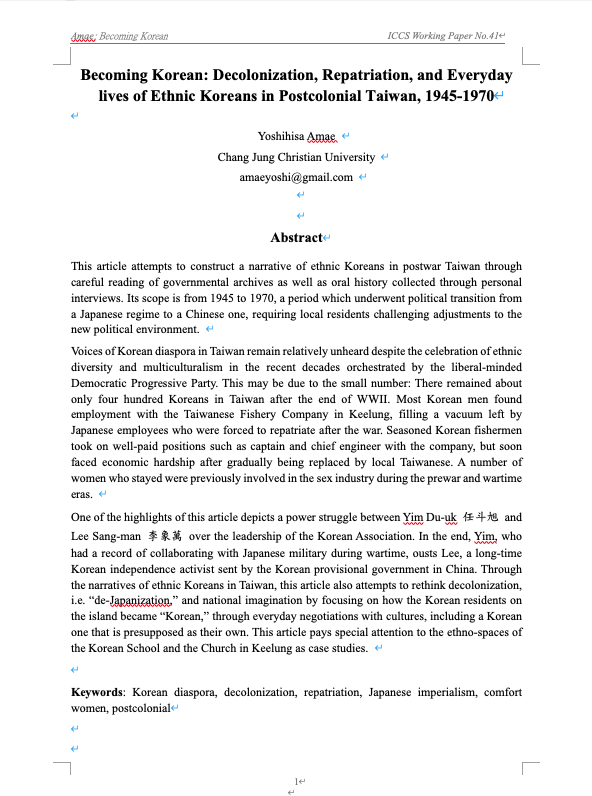

ICCS 41 Becoming Korean: Decolonization, Repatriation, and Everyday lives of Ethnic Koreans in Postcolonial Taiwan, 1945-1970
Author/Speaker|Yoshihisa Amae
Publication Date|2021-04
Keywords|Korean diaspora, decolonization, repatriation, Japanese imperialism, comfort women, postcolonial
Abstract
Abstract:
This article attempts to construct a narrative of ethnic Koreans in postwar Taiwan through careful reading of governmental archives as well as oral history collected through personal interviews. Its scope is from 1945 to 1970, a period which underwent political transition from a Japanese regime to a Chinese one, requiring local residents challenging adjustments to the new political environment.
Voices of Korean diaspora in Taiwan remain relatively unheard despite the celebration of ethnic diversity and multiculturalism in the recent decades orchestrated by the liberal-minded Democratic Progressive Party. This may be due to the small number: There remained about only four hundred Koreans in Taiwan after the end of WWII. Most Korean men found employment with the Taiwanese Fishery Company in Keelung, filling a vacuum left by Japanese employees who were forced to repatriate after the war. Seasoned Korean fishermen took on well-paid positions such as captain and chief engineer with the company, but soon faced economic hardship after gradually being replaced by local Taiwanese. A number of women who stayed were previously involved in the sex industry during the prewar and wartime eras.
One of the highlights of this article depicts a power struggle between Yim Du-uk 任斗旭 and Lee Sang-man 李象萬 over the leadership of the Korean Association. In the end, Yim, who had a record of collaborating with Japanese military during wartime, ousts Lee, a long-time Korean independence activist sent by the Korean provisional government in China. Through the narratives of ethnic Koreans in Taiwan, this article also attempts to rethink decolonization, i.e. “de-Japanization,” and national imagination by focusing on how the Korean residents on the island became “Korean,” through everyday negotiations with cultures, including a Korean one that is presupposed as their own. This article pays special attention to the ethno-spaces of the Korean School and the Church in Keelung as case studies.
Author's Bio:
Yoshihisa Amae (Ph.D. in political science, University of Hawaii at Manoa) is Associate Professor at the Graduate Institute of Taiwan Studies at Chang Jung Christian University, Tainan, Taiwan. Amae is interested in modern history and cultural politics in East Asia, with special attention on Taiwan. He has published in English, Japanese, and Chinese on topics varying from heritage politics to postcolonial representations and memories. He is currently working on a monograph of Korean diaspora in colonial and postcolonial Taiwan.
